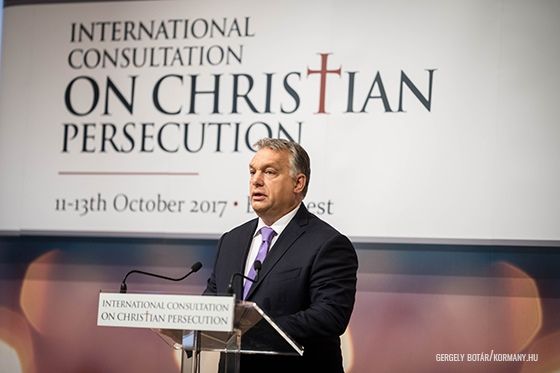 “We feel Christians in the West care less than they should. Few listen to us or feel sympathy.” Ignatius Aphrem is the Patriarch of the Syriac Orthodox Church, a church rooted within decades of Christ’s ministry on earth, and where disciples of the Lord were first referred to as Christians. According to Aphrem, “Hungary is the first country trying to do something on the ground to help us stay in our homeland.”
“We feel Christians in the West care less than they should. Few listen to us or feel sympathy.” Ignatius Aphrem is the Patriarch of the Syriac Orthodox Church, a church rooted within decades of Christ’s ministry on earth, and where disciples of the Lord were first referred to as Christians. According to Aphrem, “Hungary is the first country trying to do something on the ground to help us stay in our homeland.”
The Christian leader spoke at the International Consultation on Christian Persecution: Finding Appropriate Answers to a Long-Neglected Crisis. The government of Hungary hosted the event for religious leaders, government officials, and advocates for persecuted Christians.
Christians face hostility in more countries than any other religious group. Up to 4 out of 5 acts of religious discrimination globally are against Christians.
In 2016, Hungary created a government department for the Aid of Persecuted Christians.
“We decided to give help directly to persecuted Christians,” said Victor Orban, Prime Minister of Hungary,” and not channels of international aid” — like the UN or European institutions. “We do what local Christian leaders think should be done.”
Those who gathered to find solutions agree. “UN policies may finish the work that ISIS started,” said Nina Shea. The U.S. expert on Christian persecution pointed out that the UN has funneled money — given by the US for religious minorities — away from Christian refugees. Christians were excluded from being hired for jobs reconstructing Iraqi cities. “The UN asserted that Christians were respected by ISIS as ‘people of the book’,” she said.
In the Middle East and Africa, Christians face genocide and the eradication of their communities from Islamic extremists like ISIS and Boko Haram.
Hungary has given millions of dollars to reconstruct towns in Iraq and churches in Lebanon. The “Hungary Helps” initiative has also provided medicines in Iraq, water purification in refugee camps in Turkey and Jordan and in African countries. Over 70 persecuted young adults from Nigeria, Egypt and Iraq have been given college scholarships.
“Since we are Christian, we use Christian channels. We’re doing the opposite of what’s done in Europe. Doing acts of virtue, not just talking about it,” Orban said.
Chaldean Archbishop of Erbil (Iraq) Bashar Matti Warda thanked Hungary for $2.2 million given to reconstruct Telsqof, a town that was emptied after ISIS invaded in 2014. “Families have returned to their restored homes in Tel Askof,” Archbishop Warda reported. “A Christian presence is essential to display virtues needed in the region.”
The number of Christians in Iraq has dwindled from 1.5 million to less than 500,000. “Iraqi Christians need help to return,” said Archbishop Warda.
Speakers at the Conference concluded the needs encompass education, security and stability, humanitarian assistance, defeating terrorism, justice, and equal citizenship.
“We feel compassion for Christians who are persecuted, because Hungarians suffered under the Soviets,” said Msgr. Andras Veres, President of the Hungarian Bishops Conference, “The Soviet occupation made us sensitive to others. Being persecuted makes us stronger,” he noted, and as Jesus said, “If I was persecuted, you will be also.”
Hungarian leaders hope their actions will inspire other governments and leaders.
“We need to speak of what we’re doing — to be an example for others,” said Zoltan Balog, a pastor and the head of the Ministry of Human Capacities.
